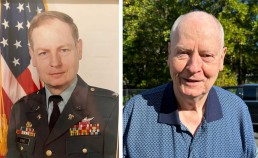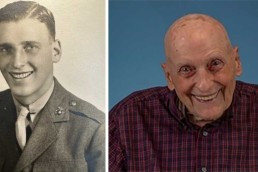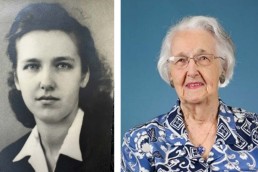Hank Eckel was just an infant when Hitler’s Army marched east past his family’s home at the Baltic Sea near the Polish border. He was born on his mother’s wealthy family estate in the state of Thuringia in a lovely house built as the result of the successful family business. This was only a few towns away from where Martin Luther lived and it became one of the five German states that ended up behind the Iron Curtain. Hank visited the area in 1992 to see dilapidated factories and six families living in his birth house.
Originally from a German colony in South West Africa, Hank’s father was a sailor on the most famous German tall ship (the Gorch Fock) sailing off South America, but was drafted at the beginning of WWII into the Luftwaffe, when it was learned that he was a glider pilot. He was assigned to the airplane and rocket testing grounds at the Baltic Sea shore and the family moved there into a house and his mother’s parents provided a DKW car, a motorcycle with side car, and a riding horse. Everything was wonderful until the end of the war, when the Russians roamed through the area and evacuated Hank, his mother, and his younger brother to the nearby city.
Meanwhile, Hank’s father was taken prisoner by the Russians, but was able to escape and find his family. The home and all belongings were lost. The family decided to move to the western part of Germany. At age 6, Hank remembers that the family, and many other people trying to get away from the Russians, crowded into a cattle train heading west. The family ended up in a small village, living with a farmer. Many people were poor in those days. The Iron Curtain went up. Hank’s mother gave birth to two more boys and she desperately missed her sister and parents, now in East Germany and unreachable. She died at age 30, when he was 10 years old with three brothers.
Hank was able to go to school from age seven to 16 and spoke German, English, and French. He made every effort to improve his school English through frequent interface with American GIs. He applied for work at Standard Oil, Germany, in Frankfurt. His training in all aspects of the company, offices and hand-on at the airport, Main river harbor, trade school, company schooling, etc. led to excellent business knowledge. At 19, he was promoted to the Corporate Headquarters in Hamburg, where he applied for immigration to the USA and also met Christa, whom he married two years later.
A friendship with an American girl in Germany led to her family sponsoring him as an immigrant. Standard Oil (ESSO, Germany), gave him his voyage across the ocean to Canada, from there he took a train to New York city and rode a Greyhound bus to Ohio in late 1959. A survivor of war-torn Germany in rubble and the disgrace of Hitler, he decided to build a new life and career in the United States.
As a 20-year-old immigrant he was drafted into the US Army and moved rapidly to the rank of Staff Sargent. He served a year in Korea, maintaining correspondence with Christa. Her experience as a two-year-old in the war was to seek shelter in the basement of their house with her mother during an air raid, which destroyed the house and all their belongings, leaving them homeless. Her father was traced to Stalingrad, but was never heard from again.
Whenever possible, Hank earned credits in universities, and while stationed in Germany, returned on leave to Ohio to become an American citizen after just three years from the date of his US arrival. Being interested in flying, he attended helicopter flight school and served two years in Vietnam flying helicopters. He had a satisfying, diverse military career, retiring as Colonel with 33 years of service.
Christa retired from Government service as a GS-14 Contract Audit Manager with a Virginia CPA. He and Christa have one daughter, a judge in the PA court system, and two granddaughters.




